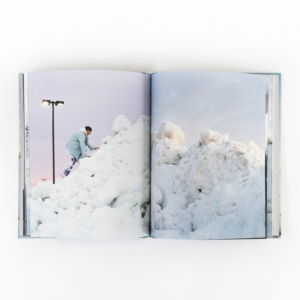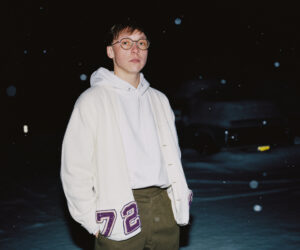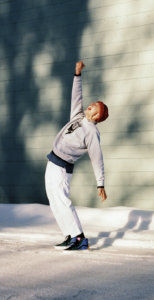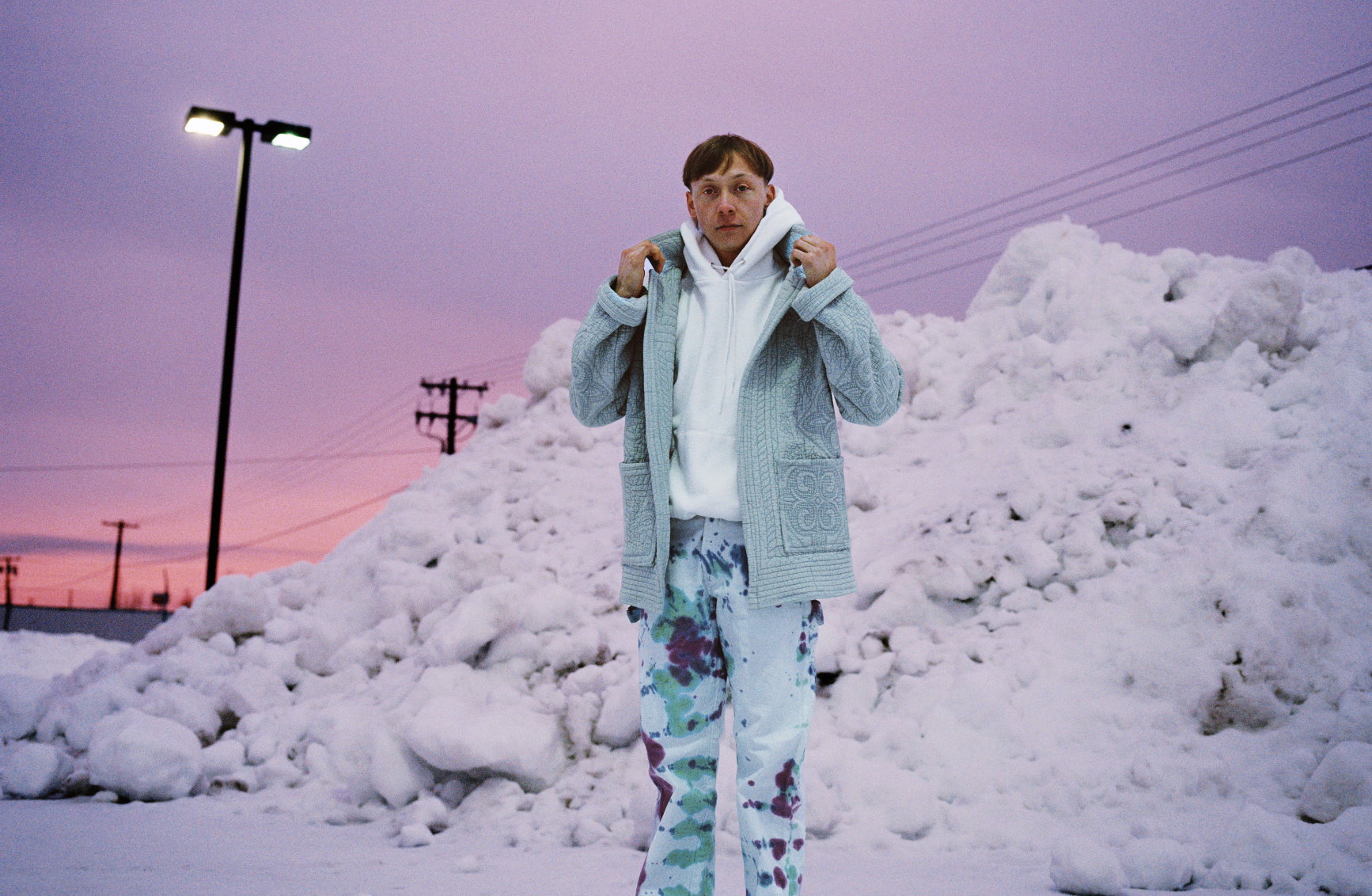Foto-© Emma Sheffer
Quinn Christopherson veröffentlicht am Freitag sein Debütalbum Write Your Name In Pink bei PIAS. Er ist ein Singer-Songwriter aus Anchorage, Alaska, das jüngste von vier Kindern indigener Eltern – seine Mutter ist Ahtna Athabascan, aus dem Landesinneren; sein Vater ist Iñupiat, aus der Nordwest-Arktis. Christopherson ist trans* und damit ein Mann, der zunächst ein Leben lang von Fremden auf dieses oder jenes Geschlecht reduziert wurde. Um es zusammenzufassen: Quinn Christopherson ist ein trans-indigener Singer-Songwriter aus der größten Stadt im 49. Bundesstaat der USA. Aber wie jeder andere Mensch auf der Welt, ist er vor allem mehr als die Summe seiner demografischen Merkmale. Auf seinem Debüt verhandelt er Identitätsfragen und Erinnerungen auf eine trockene, nie kitschige Art.
Wir haben Anfang September mit ihm über Zoom gesprochen. Im Interview erzählt er, dass ihm das Erzählen von Geschichten in die Wiege gelegt wurde, warum das prägendste Erlebnis auf der Wild Hearts Tour mit Sharon van Etten, Angel Olsen und Julien Baker die gemeinsamen Essen waren und wieso man manchmal eine rosarote Brille braucht, um zurückzuschauen.
 Congratulations on your debut album Write Your Name In Pink. It is coming out next week, are you already in the rush of the release day or how do you feel about it?
Congratulations on your debut album Write Your Name In Pink. It is coming out next week, are you already in the rush of the release day or how do you feel about it?
I am not sure. The way I think about music is that you put it out and then everyone gets to take their time with it and listen. It is a whole piece of work. I almost do not really expect an immediate reaction. I am not sure, what it will feel like. I worked so hard on it, and I am so proud of it. I cannot wait to share it.
Are you listening to it in the meantime outside of work-related situations?
I have, for sure. I loved to listen to it in different places like in the car, in the house, outside. But that was when it was first made. I have not listened to it recently. I will listen to it when it is out and everyone has got ears on it.
You just came back from The Wild Hearts Tour with Sharon van Etten, Angel Olsen and Julien Baker. Did you play the new songs on that tour? Can you tell us more about that experience?
Yes, I played the new songs! That tour was so much fun, there were over 40 of us. Getting to know everyone, spending time, and eating with people was very cool. All the bands were so nice. It was a catered tour and we got to spend a lot of time eating together. I love that. To me, the best time to get to know someone is over food. I feel really lucky that we got to share so many meals together.
Are you writing when you are traveling?
Actually no. I do a lot of listening, thinking, and writing down little ideas and concepts about what I want to say as a whole. When I go home, I dig deeper and zoom in. On tour, there is not a whole lot of time alone. A lot of my songs start in solitude.
Did you write the songs for Write Your Name In Pink with an album in mind or did you collect them over the years?
The first song of the record I wrote is Neigborhood. In that song I had given my mom a new character; where I understood everything that she put me through from a different perspective. In all my songs about her before, I have written her as a villain. It was that song, when I realized that she was not trying to hurt me, but she was hurt. I had a new empathy for her. It was that song, where I thought, it is kind of a superpower to rewrite your perspective on something. That was cool. 2005 is a similar tool. It is about Middle school, and those years were so rough for me. Not really at school, but personally. I did not have a good time. But there were little glimpses of things that I could zoom in and remember fondly. Now, when I sing the song and I think about those years, it is about good things. Yes, it is wearing rose-colored glassed, but I needed that. The record is a lot of figuring out how I feel about things now.

The lyrics in 2005 say, “If I could go back I’d say it’ll all get worse / Nothin prepares you for this world / And you’ll wanna go back to simpler times.” Being young is quite complicated for every teenager and as you said, you did have a very rough time. Why do you think it was simpler still?
It was simpler in so many ways and it was complicated in others. What I miss is how things were simple. Being a kid is complex, being human is complex. My whole upbringing was full of joy and other things, too. It does not mean that I want to go back to all the chaos. It is more about the times when I felt good and safe.
 As a listener we meet many characters in your songs. We have already talked about your mother being one of them. How do you handle that in the writing or recording process? If the people in the songs are inspired by real people around you, do you talk with them first?
As a listener we meet many characters in your songs. We have already talked about your mother being one of them. How do you handle that in the writing or recording process? If the people in the songs are inspired by real people around you, do you talk with them first?
If it has to do with family – my family has already heard it all. They are my biggest fans. We are all storytellers. That is how we pass time. I learnt from them how to tell my stories. This is something that we champion on each other. It is how we were raised. The songs about other people, friendships, other relationships: I do not mention anyone by name, or I have changed the name. If I do not mention them by name, I would not send them the song. But people hearing the song and knowing that it came from where it came from, that is cool.
 I am very interested in a quote of yours: “As a trans person, a queer person, an Alaska Native person, ideas are placed upon me.” As an artist, people also project things on you. How do you find Quinn inside all these boxes?
I am very interested in a quote of yours: “As a trans person, a queer person, an Alaska Native person, ideas are placed upon me.” As an artist, people also project things on you. How do you find Quinn inside all these boxes?
I just try to take it with grace. I am never trying to speak for everyone, I am always trying to speak for myself. I think you can tell that in my songs. I guess I do get preachy sometimes. But most of the time, I am just trying to figure things out for myself. I want to keep with that. It is very nuanced. Things about me are so matter of fact. That is what I am trying to keep in the writing. In 2005 there is the line, “I joined a father daughter bowling league”. People might hear that and wonder what I mean. But that is what I did at the time. It is silly, it is a funny little moment. It is so matter of fact and it is so normal to me, if I put it into a song and people hear my voice saying that it might become a little more normal along the line. I do not go into a big thing and explain it. Even if someone disagrees with me, but they can find that line relatable that is a the most beautiful thing. It is subtle.
You said you were brought up with storytelling. You used to write poems as well. How did the transition to make music happen?
I always liked singing. I did not grow up playing an instrument. I stuck with poems for a while. When I was 19 my dad got me a little ukulele. It was so fun. I made the dumbest little songs on it. I did not play it for long until I got a guitar. That was when I unlocked something. It was so much more eligible to share it with people. All I want to do is share. I am a performer. I love to perform live. As a kid I had a box full of magic tricks, performing for the family. It just makes sense that I found that other thing to bring something on stage.
Yes, it is way harder to do that with poetry. Thank you for the interview!










